HouseDrive
Enjoy the right house and home
The UK house and home market is different from that in the rest of Europe, and is changing. Constant increases in house prices and values have encouraged people to ‘get on the ladder’ and constantly buy more expensive properties, secure in the knowledge that even if they struggle to afford payments the value of the property will quickly increase and generate equity value.
This has also led to people buying properties and renting them out, again secure in the knowledge that increases in capital value and ongoing rental income make this a good investment, leveraged with a mortgage.
This has led to problems buying a house
This constant increase in prices has meant that many people now can’t afford to buy their first house, and have to rent, or stay living with parents for longer.
Social housing is low cost rented housing aimed at people who can’t afford the private sector – whether buying or renting. See our section below on this.
Click on a heading below and see a summary, and if you're interested you can GO and read more about it!
Here are some facts and stats about houses. GO!
See how changes in the housing market have transformed lives. GO!
See details on social housing. GO!
Look at the government’s policy here. GO!
See how the market has changed over the years. GO!
Look at the financial implications of buying. GO!
See bothe sides of this critical decision. GO!
If you’re a visitor to our site you can join and download information, assess your own health and create your own action plans, and even contribute to our site. GO!
See a testimonial. GO!
See what you can do next. GO!
We have some additional information and stuff on this subject. GO!
Facts About Housing
The average UK house price was £277,000 in February 2022, which is £27,000 higher than this time last year.
Real estate investing has created 90% of the world’s millionaires
The art of ‘flipping’ is defined as buying, renovating and selling a property within 12 months.
The average profit this year is £40,955, a 26 per cent return.
London continues to be the region with the lowest annual growth at 8.1%. UK House Price Index
UK house prices have risen at their fastest rate in over seven years – increasing by 10.9% compared to this time last year – seven capital
“House prices will peak in 2026, that is at the end of a 14-year cycle in house prices within a business cycle of 18 years.” Fred Harrison in MoneyWeek
The top UK city for profitable rental yields in 2021 was Sunderland – 7.27% annual rental yield.

The dynamic housing market and how it has transformed lives
In the early 20th century less than 10% of UK homes were owner-occupied – this rose to 62% by the early 21st century, reaching over 27 million households in 2017.
Privately owned property is freehold or leasehold (where the owner buys the right to use the land and property for a time).
Most is bought with a mortgage. Since the 1980s securitisation of mortgages led to repackaging of mortgage debt to provide an income flow, which was involved in the 2008-9 financial crisis.
Property is also rented, either privately, where landlords typically use short term (often 6 months) tenancy agreements, or local authority rented, where tenants pay a weekly or monthly rent, often subsidised and below market rate. Housing Associations offer affordable properties partly owned partly rented.
The housing market
The housing market is an indicator of household wealth – when prices rise or fall it creates a positive or negative wealth effect, even as far as moving into negative equity, where the mortgage has a higher value than the house, as in 1990 and 2008. Rising equity can give rise to increasing housing equity withdrawal.
.
Other factors affecting home ownership include population, income, interest rates and social trends.

Social Housing
The amount of social housing for rent has been slowly rising for the last ten years – over 4 million homes were rented from councils or housing associations in 2017. Social rents are about 50% of market rents.
Housing associations are independent, not-for-profit organisations that provide social housing for people in need.. They are sometimes called ‘registered social landlords’. They sometimes offer shared ownership schemes and have to be registered with Homes England. They were re-classified as private rather than public in 2016, removing £70 billion form public debt and allowed them to increase borrowing.
This is mainly due to an increase in homes rented from housing associations. Around 5,000 new homes were built for social rent in 2017, and another 1,00 were bought or converted.
Affordable Housing
There is also ‘affordable housing’ where the rents can only be around 80% of market rents.
To see an explanation of what these are, click the button below for an explanation from the Designing Buildings wiki.
There were 24,000 homes built for affordable rent in 2017 and 2,000 bought or converted.
Intermediate rent’ is defined as ‘above social rent, but below market levels’ (House of Commons library), and these are counted as affordable homes.
Social housing can be sold, with the best known scheme being ‘Right to Buy’ for council housing, with an equivalent scheme for housing associations. Over 16,00 homes were sold under right to buy in 2017/18, which is less than the year before. Around 5,00 were sold under different schemes.
The government committed to replacing all homes sold under right to buy after 2012, but this target isn’t being met.
Social Housing
Shelter have an article on social housing which tells the story of social housing. We provide an excerpt below and a link – it’s explained in the video here.
“For generations, social housing played a vital role in meeting the housing needs of people across the country, giving millions the quality and dignity of life that insecure and unaffordable private renting could not. Today, England’s much-reduced stock of social housing is continuing to shrink, making it tightly rationed and unable to play the same role.
Last year we lost around 17,000 more social homes than we built. Combine this with rising house prices and it’s easy to see why more and more people have no option but to try getting by in insecure and often unaffordable, privately rented housing.
Too many working families still have to rely on housing benefit (Local Housing Allowance) to keep up with sky-high rents. What has happened to the solution that once existed: low-cost social housing?”
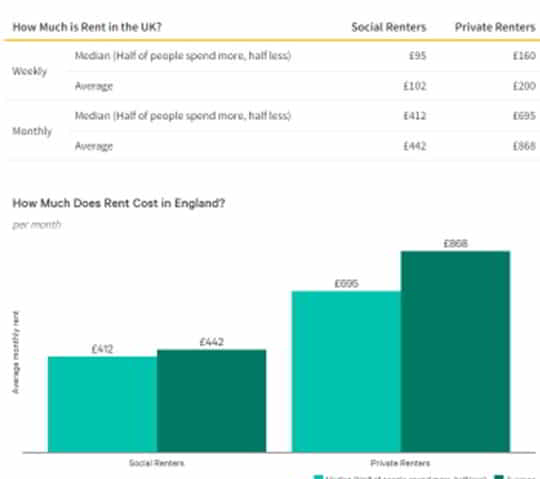
Facts from Shelter:
4.4 million
In the 35 years following the end of the Second World War, local authorities and housing associations built 4.4 million social homes
94,140 homes
In 1980, 94,140 social homes were built. But by 1983, supply had halved to just 44,240 new social homes
6,287 homes
In 2018/19, just 6,287 new social homes were delivered – nowhere near enough for the 1.1 million people on the waiting list
There is a House of Commons Briefing paper on Social Housing Reform in England dated 25th February 2022 mentioning a green paper and a white paper which you can download.

Governments policy on mixed community housing - does it work or is it a nightmare?
This heading sounds tame to be honest but it is the biggest social reengineering project that has taken place, ever. This is a government policy started back in the 90s when several projects were conducted around mixed community housing.
In simple terms instead of having defined areas where people of a certain group live and congregate such as council estates with generally lower income population and estates with elderly people living together. The Government ran several projects to aid the research on policy decision making. Over the last 25 years this policy has grown and developed into a life form and clearly has been modified and altered accordingly.
The feedback from many reports and reviews have been criticised because they are insufficiently evidenced based but have been emphasised positively to maintain government policy.
What does this policy mixed community housing mean exactly?
When a new housing development is proposed the government and local councils insist under the policy that the independent house builders build affordable housing for all people. There is agreement between house developers, governments and councils as to how big the percentage of affordable housing will be. Once this is concluded houses associations from all area can apply to take a section of the affordable housing for them to allocate to their local community which could be a significant distance from the development site.
New housing developments are now a mixture of detached, link detached, bungalows, 2/3 storey terraced properties, flats and apartments. They all vary in price and up to 40% are used for rental housing in the affordable market section.
There has been an independent review of the research carried out as to the effectiveness of mixed community housing, and the link is below. It is a hard read but clearly demonstrates that there are fundamental flaws in the benefits of mixed community housing.
We suggest before buying a house on a new housing development that you do your homework and check out what the mix of mixed community housing will be. See this article.

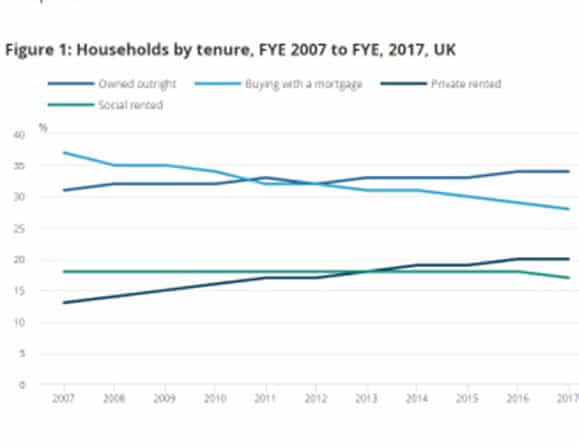
Different housing trends and how the market has changed over the years
Younger people are renting in preference to buying even though interest rates are low and mortgage offers are up to 95% and there are several government joint ownership schemes.
House Prices
You might be interested to know what's likely to happen to house prices. Money To The Masses explain what affects house prices:
The overall health of the economy: Unemployment and wage growth affect consumer confidence, which affects people's attitudes to moving and prices
Interest rates:The Bank of England set the base rate and if this is low people can afford to spend more which pushes prices up.
Supply and Demand: Local house prices are determined by a location's desirability and by how many similar properties there are.
The UK House Price Index is probably the most accurate measure as it is calculated on completed sales and includes cash sales and mortgages. There is however a time lag.Other indices include Nationwide, Halifax and Rightmove.
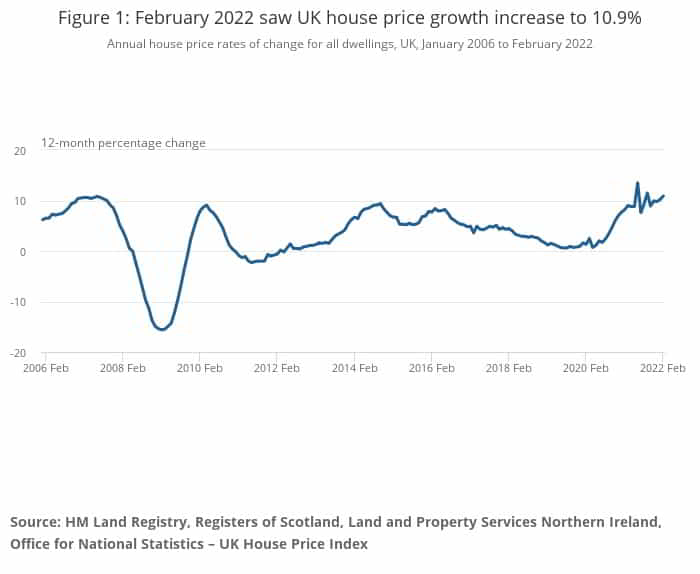
Buying a house is a win-win situation based upon the long-term market trends
When money is this cheap to borrow why wouldn’t you. Over a 30-year period if you earn good money and the latest mortgages only require 5% deposit then buying a home is a good investment. Especially when you consider that you house will increase without you doing a thing by on average 5 to 10% each year. .
If you buy a house in a good developing area that needs modernisation then you can make even more money after 5 years.
An excerpt from the UK House Price Index:
“The latter half of 2020 saw the UK’s average house price growth accelerating. This trend continued into 2021; the UK average house price for February 2022 was £277,000, up from £275,000 in January 2022.”
However, there is a sense that things may change: This is an excerpt from MoneyWeek in May 2022.
“House price growth is starting to slow, reckons Nationwide – in April, annual growth fell from 14.3% to 12.1%.
Cash-strapped first-time buyers will not be rejoicing any time soon.
But is this a sign of things to come?”
It believes the main reason for markets doing badly is not Ukraine or higher energy prices, but central banks raising interest rates.
Rates have been low for some time now – see the chart below.
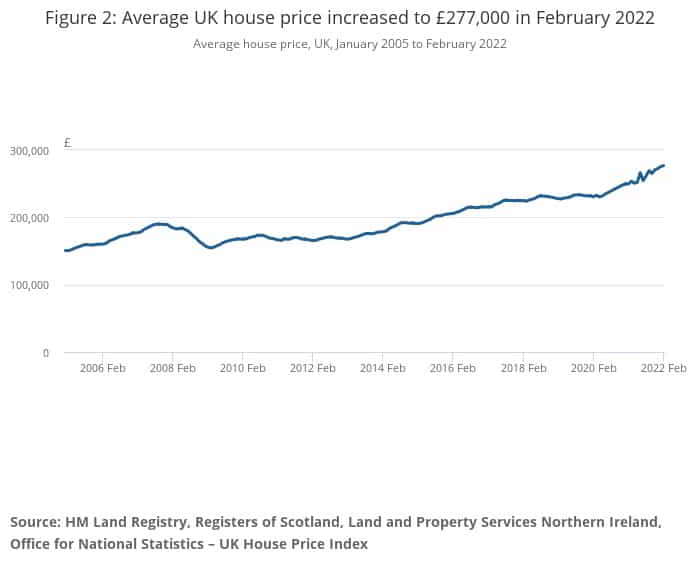

Let’s look at the average mortgage plus interest monthly payments in the UK
As of April 2021, Lloyds Banking Group reports that:
• The average UK monthly mortgage repayment is £753.
• Renting a property cost £821 on average.
• Monthly mortgage costs have increased 31% in the last ten years.
• The average first-time buyer deposit is £58,986 – increasing by £11,677 since March 2020.
• While buying a home will cost an average of £753 a month, these statistics show that it remains more affordable in terms of regular expenditure than renting.
• The average mortgage cost has climbed 31% in a decade, but the comparable figure for rented housing is 36%.
So which is better - buying renting your house?
This is a key decision – for some the most important financial decision they might make. It can be life-changing – it certainly can cause a huge amount of commitment. The information below is based on what’s happened in the UK housing market in the last 10 years, and might help you to make a decision.
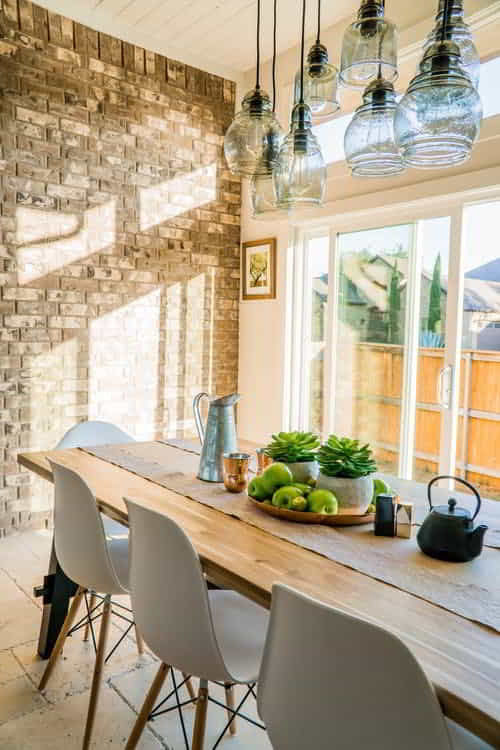
Why rent when you can buy - which is the best over the long term? Is it worth it?
The simple answer is that everyone’s circumstances are different. Some people have low paid employment and don’t meet the criteria for lending. Others have bad credit records or don’t have the deposit. Some people don’t like the scary responsibility of having a huge liability around their necks for 30 years. Whilst some people don’t want to be tied to a specific location and prefer to move around. Everyone is different.
Financially it seems to make sense to buy:
As a financial model buying is best because interest rates are low. The housing market in the UK is very progressive and always on the rise.
The average UK monthly mortgage repayment is £753.
Renting a property cost £821 on average.
If you can afford a mortgage, get one and buy a house. Try to buy a place that is resalable. Buy in a decent area. A property that may need a little bit of work doing to it and hang onto it for 5 years. In most instances you will make money.
However, it comes with strings attached:
See the video below.
Only Buy Your Home If You Answer ‘Yes’ To These 6 Questions | Rent vs Buying UK
Only Buy Your Home If You Answer ‘Yes’ To These 6 Questions | Rent vs Buying UK
Is buying a property always better than renting? In the UK we’re obsessed with home ownership, and you’ll have heard people say that renting is just throwing money away. But is this really the case?
Because of this belief many young people stay living within their childhood bedroom well into their late 20s because they can’t afford to buy and yet refuse to rent.
Saving for a house deposit is a tall order but let’s assume you have been saving diligently and have managed to put aside enough to secure a home.
Before taking the leap into home ownership you need to answer ‘yes’ to the questions in this video.
Plus, we’ll finish up with our best less-talked-about financial tips for when buying a home. Let’s check it out…
For visitors
Why don't you join us?
You can register to join us as a member, when you’ll be able to download our stuff and comment, or as a YouDriver when you’ll also be able to check your health and set up your own action plans to make some improvements. If you’ve already registered, sign in below. Or let us know what you think.

Next Steps
It doesn’t matter what stage you’re at – it’s important to be the best you can be. At the end of the day it’s about taking personal responsibility – You Drive!
It’s really your choice. You can find out more information about the subject, or see other institutions that can help by going to Support. There you will find organisations, training, coaching, self-help courses and other items to support your personal change. We have also started developing a panel of experts to provide info, advice, help and support.
Get Support
There are times when you need some help to meet your aims – a helping hand. That might be an organisation that can provide you with some help, some specialised information, a particular book or tool to help, or just getting some background reading material.
We have a lot of items which appear on our Drives and other pages, which you can go to by clicking on the picture or link. Some contain affiliate links and we may receive a tiny commission for purchases made through these links.
If you know of anything which could help you or our other visitors then please click the button on the right, which will take you to a Contacts page where you contact us.
Experts
We are compiling a list of experts who can provide advice, help or specialised services. You will be able to access these experts from anywhere on our site you see our ‘Experts’ symbol. Click the green E to see what our Experts list will look like, with a couple of imaginary ‘experts’ added!
More Information
Scroll down to see more information on this Drive.
If you register you can also download reports, white papers, quizzes and other collaterals. We will never ask you for any financial information, and we’ll only send you the information you want. You can register for our site either above or in the footer below. You can provide your own questions and experiences in order to help other members. We only moderate for spam and inflammatory language – see our moderation policy.
If you’ve found this interesting, then please share it on social media. Choose your network!
More information
How to Buy Your First Home
(And How to Sell it Too)
Phil Spencer, property expert and co-presenter of hit series Location, Location, Location, provides everything you need to know to help you buy (and sell) your first home
Let’s Buy A House
Everything you need to know when buying your home .
In his book “Lets Buy a House, Everything You Need to Know when Buying your Home” Tom Archer licenced Mortgage Adviser explains the process for buying your home from start to finish. In his book he explains the role of each profession involved to help you understand what it is they do. With this knowledge you will be able to make more informed decisions during critical points of the process.
Help me, I’m buying a house
A practical guide for buying your own home in England and Wales. From First Time Buyers, for First Time Buyers and those who don’t know what they are doing.
Almost 300 pages of hands-on guidance. An essential and fun read about buying your own home – from First Time Buyers, for First Time Buyers. Illustrated by Ben Jones to make you smile.
45 Ways to Buy Property
Strategies and tactics to build your property portfolio
Property provides a rare opportunity to create wealth and replace your income, do you want to replace your income in 2022?
But, it’s an area shrouded in mystery. How do people grow a portfolio of 20, 30 or 40 properties?
General advice on buying a home from MoneyHelper
Overall advice on housing issues from Citizens Advice
Information on council housing and housing associations from the government
See how to apply for council housing – from Shelter
You can download your own Excel calculator which allows you to model whether it’s better to rent or buy there’s one from Excelexperts. There are two – one with blank values which you should use, and one with example values entered. The third button will open a YouTube video explaining how to use the calculator.




















